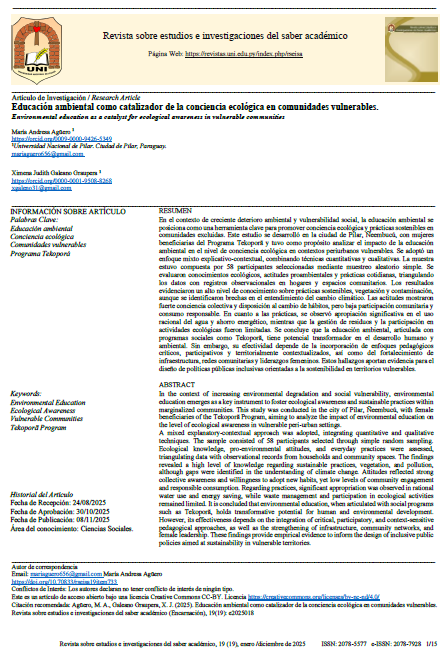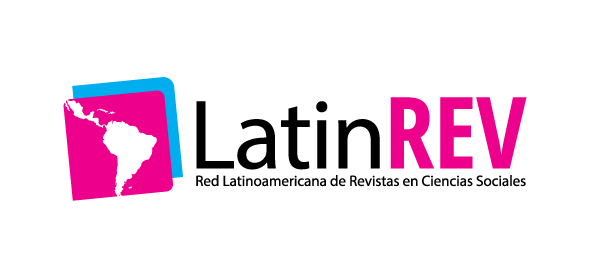Environmental education as a catalyst for ecological awareness in vulnerable communities
DOI:
https://doi.org/10.70833/rseisa19item733Keywords:
Environmental Education, Ecological Awareness, Vulnerable Communities, Tekoporã ProgramAbstract
In the context of increasing environmental degradation and social vulnerability, environmental education emerges as a key instrument to foster ecological awareness and sustainable practices within marginalized communities. This study was conducted in the city of Pilar, Ñeembucú, with female beneficiaries of the Tekoporã Program, aiming to analyze the impact of environmental education on the level of ecological awareness in vulnerable peri-urban settings.
A mixed explanatory-contextual approach was adopted, integrating quantitative and qualitative techniques. The sample consisted of 58 participants selected through simple random sampling. Ecological knowledge, pro-environmental attitudes, and everyday practices were assessed, triangulating data with observational records from households and community spaces. The findings revealed a high level of knowledge regarding sustainable practices, vegetation, and pollution, although gaps were identified in the understanding of climate change. Attitudes reflected strong collective awareness and willingness to adopt new habits, yet low levels of community engagement and responsible consumption. Regarding practices, significant appropriation was observed in rational water use and energy saving, while waste management and participation in ecological activities remained limited. It is concluded that environmental education, when articulated with social programs such as Tekoporã, holds transformative potential for human and environmental development. However, its effectiveness depends on the integration of critical, participatory, and context-sensitive pedagogical approaches, as well as the strengthening of infrastructure, community networks, and female leadership. These findings provide empirical evidence to inform the design of inclusive public policies aimed at sustainability in vulnerable territories.
Downloads
References
Ariza, C.P., Rueda Toncel, L.A., & Sardoth Blanchar,
J. (2017). Educación ambiental: una estrategia global para la sustentabilidad. Revista Boletin Redipe, 6(5), 64–70. https://revista.redipe.org/index.php/1/article/view/258
Arroyo-Ñahui, M.F., Condori-De la Cruz, W.C.,
Condor-Salvatierra, E.J. (2024). Impacto de la Estrategia de las 3R en la Actitud Ambiental de Estudiantes Secundarios. Revista Alpha. 8(24), 898 – 915. https://revistaalfa.org/index.php/revistaalfa/article/view/418/1009
De Sarlo, Giulia (2017).El despertar de la conciencia
ecológica a través de la literatura infantil y juvenil. Didácticade la literatura y educación medioambiental. Revista Iberoamericana de Ciencia, Tecnología y Sociedad - CTS, 12(35). 217-228. https://www.redalyc.org/pdf/924/92452928011.pdf
Fals Borda, O. (1987). El reto de la
investigación‑acción en América Latina. Universidad Nacional de Colombia. Sociología internacional. 2(4). 329-347. https://journals.sagepub.com/doi/abs/10.1177/026858098700200401
Feria Guerrero, A. del C. (2023). Revisión
sistemática de la conciencia ambiental. Ciencia Latina Revista Científica Multidisciplinar, 7(3), 1586–1606. https://doi.org/10.37811/cl_rcm.v7i3.6297
Gadotti, M. (2003). Pedagogía de la Tierra y cultura
de la sustentabilidad. Paulo Freire. Revista de Pedagogía Crítica, (2), 61–76. https://doi.org/10.25074/pfr.v0i2.519
González Gaudiano, Édgar J., Bello Benavides,
Laura, Maldonado González, Ana Lucía, Cruz Sánchez, Gloria Elena, & Méndez Andrade, Luis Mario. (2019). Nuevos desafíos para la educación ambiental: la vulnerabilidad y la resiliencia social ante el cambio climático. Cuadernos de Investigación UNED , 11 (1), 71-77. http://www.scielo.sa.cr/scielo.php?script=sci_arttext&pid=S1659-42662019000100071&lng=en&tlng=es.
Hernández, R., Fernández, C., Baptista, P. (2014).
Metodología de la investigación
(6.ª ed.). McGraw-Hill Education.
Kollmuss, A., & Agyeman, J. (2018). Cuidado con la
brecha: ¿Por qué las personas actúan de manera ambientalmente responsable y cuáles son las barreras para el comportamiento proambiental? Investigación en Educación Ambiental 24(1), 97–114. https://doi.org/10.1080/13504620220145401
Leff, E. (2004). RACIONALIDAD AMBIENTAL
La reapropiación social de la naturaleza. Siglo XXI. https://ru.iis.sociales.unam.mx/bitstream/IIS/4937/1/Racionalidad_ambiental.pdf
Louv, R. (2008). El último niño en los bosques:
Salvando a nuestros hijos del trastorno por déficit de naturaleza (ed. rev.). Algonquin Books. https://cdn.bookey.app/files/pdf/book/es/los-%C3%BAltimos-ni%C3%B1os-en-el-bosque.pdf
Ley N° 1682/01. Que reglamenta la
información de carácter privado. Publicada el 19 de enero de 2001. https://www.bacn.gov.py/leyes-paraguayas/1760/ley-n-1682--reglamenta-la-informacin-de-carcter-privado
Ley N° 1966/02: Que modifica, amplía y deroga
varios artículos de la Ley N° 1682/01 “Que reglamenta la información de carácter privado”. Publicada el 7 de septiembre de 2002. Disponible en: https://baselegal.com.py/docs/e2e554a4-d899-11e9-8e7a-525400c761ca
Márquez Delgado, D. L., Hernández Santoyo, A.,
Márquez Delgado, L. H., & Casas Vilardell, M.
(2021). La educación ambiental: evolución conceptual y metodológica hacia los objetivos del desarrollo sostenible. Universidad y Sociedad, 13(2), 301–310. https://rus.ucf.edu.cu/index.php/rus/article/view/1968
Medina-Arboleda, IF, & Páramo, P. (2024). La
educación ambiental y para el cambio climático en Latinoamérica: Una revisión de alcance. Suma Psicológica, 31 (1), 63–93. https://doi.org/10.14349/sumapsi.2024.v31.n1.8
Michels, A.(2023). Mujeres rurales: pilar
fundamental de la sociedad para la adaptación al cambio climático. GIZ Programa EbALAC. https://ebalac.com/es/noticias/56-noticias/363-mujeres-rurales-pilar-fundamental-de-la-sociedad-para-la-adaptacion-al-cambio-climatico#:~:text=De%20forma%20integral%2C%20se%20fortalecen,espacios%20de%20toma%20de%20decisi%C3%B3n.
Miranda Esteban, A., Bedolla Solano, R., &
Bedolla Solano, I. (2024). Programa de Educación Ambiental No Formal y Sustentable sobre Residuos Sólidos Urbanos (PEANFSRSU) para habitantes de la Comunidad, Las Vigas, Gro., México. RIDE Revista Iberoamericana Para La Investigación Y El Desarrollo Educativo, 14(28). https://doi.org/10.23913/ride.v14i28.1905
Morales Armas, O., Amador Lorenzo, E. L., &
Pedroso Martínez, M. (2025). Estrategia de educación ambiental para el desarrollo comunitario. Revista Pensamiento Transformacional, 3(11), 45–65. https://doi.org/10.63526/pt.v3i11.90
Novo, M. (1998). La educación ambiental: bases
éticas, conceptuales y metodológicas. Editorial Universitaria–Universitas. https://unesdoc.unesco.org/ark:/48223/pf0000114768
Olivares Sánchez, R. E., Leyva Aguilar, N. A.
(2023). Bases teóricas de la conciencia ambiental como estrategia para el desarrollo sostenible. Revista Alfa de Investigación en Ciencias Agronómicas y Veterinaria, 7(21). https://doi.org/10.33996/revistaalfa.v7i21.242
Pedraza-Jiménez, Yamile, Hernández-Barbosa,
Rubinstein, & Alvear-Narváez, Nilsa Lorena. (2023). Educación ambiental comunitaria. Tecné, Episteme y Didaxis: TED , (54), 7-10. Epub 07 de febrero de 2024. http://www.scielo.org.co/scielo.php?script=sci_arttext&pid=S0121-38142023000200007&lng=en&tlng=e
Ramírez Contreras-Piana, A. (2018). Un relato
etnográfico de la conciencia ecológica: historias y prácticas cotidianas de transformación y resistencia. Letras Verdes, (24), 181–200. https://doi.org/10.17141/letrasverdes.24.2018.3245
Sauvé, L. (2006). La educación ambiental y la
globalización: desafíos curriculares y pedagógicos. Revista Iberoamericana de Educación, 41, 83–101. https://doi.org/10.35362/rie410773
Stern, P. C. (2020). Hacia una teoría coherente
del comportamiento ambientalmente significativo. Journal of Social Issues, 76(1), 75–94.
Thomas, JW (2000). A review of research on
project-based learning. The Autodesk Foundation. San Rafael, CA: Autodesk. http://www.k12reform.org/foundation/pbl/research.
UNESCO. (1978). Conferencia
Intergubernamental sobre Educación Ambiental: Tbilisi (URSS), 14–26 de octubre de 1977. Declaración final y recomendaciones. UNESCO.
UNESCO. (2021). Educación para el desarrollo
sostenible: Una hoja de ruta. https://unesdoc.unesco.org/ark:/48223/pf0000374802
UNESCO. (2022). Educación ambiental para la
equidad y la resiliencia comunitaria. Organización de las Naciones Unidas para la Educación, la Ciencia y la Cultura.
Vinti, G &Vaccari, M.(2022). Solid Waste
Management in Rural Communities of Developing
Countries: An Overview of Challenges and Opportunities.MDPI. https://doi.org/10.3390/cleantechnol4040069
Virelles Espinosa, Imilsis de los Ángeles, &
Orozco Acuña, Camilo. (2024). La educación ambiental comunitaria desde la extensión universitaria en el territorio. EduSol, 24(86), 71-82. http://scielo.sld.cu/scielo.php?script=sci_arttext&pid=S1729-80912024000100071&lng=es&tlng=es.

Downloads
Published
License
Copyright (c) 2025 María Andresa Aguero, Ximena Judith Galeano Graupera

This work is licensed under a Creative Commons Attribution 4.0 International License.
Creative Commons Attribution License CC-BY
You are free to:
Share — copy and redistribute the material in any medium or format.
Adapt — remix, transform, and build upon the material for any purpose, including commercially.
Under the following terms:
Attribution — You must give appropriate credit, provide a link to the license, and indicate if any changes have been made. You may do so in any reasonable way, but not in any way that suggests that you or your use is endorsed by the Licensor.







